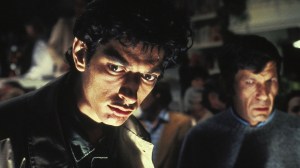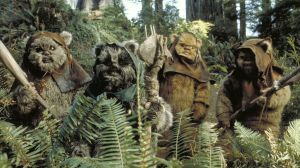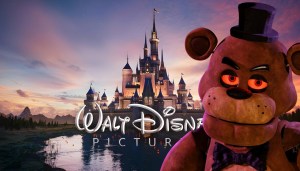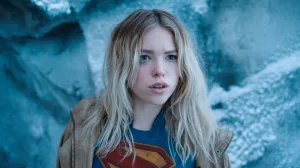Tales From the Loop has been charming and surprising viewers for almost a month now, ever since it initially debuted on Amazon Prime. The series, which is inspired by Simon Stalenhag’s series of paintings and RPG of the same name, follows the citizens of Mercer, Ohio. A small Midwestern town that is stationed around the Mercer Center for Experimental Physics, or “The Loop”, Mercer becomes plagued by a series of unexplained phenomena caused by the center’s particle accelerator. The series’ energy is overwhelmingly apparent in the series premiere, a poignant, time-travel-infused episode called “Loop”. The episode follows a young girl (played by Ant-Man‘s Abby Ryder Fortson) who grows curious about The Loop after her mother disappears.
Videos by ComicBook.com
The episode is directed by Mark Romanek, who also serves as an executive producer on the entire season. Romanek has developed a career for gorgeous and poignant pieces of film, whether in feature-length ventures like Never Let Me Go and One Hour Photo, or in music videos for artists like Johnny Cash, Taylor Swift, and Beyonce.
ComicBook.com recently got to chat with Romanek about his involvement with Tales From the Loop, the challenge of establishing the show’s aesthetic, and what role he would like to have in a potential second season. In addition, we spoke about the upcoming anniversary of Never Let Me Go, his abandoned The Shining prequel, and his aspirations in the horror genre.

Tales from the Loop
ComicBook.com: How did you first become familiar with Tales from the Loop? Because it’s obviously such an interesting source material to draw from.
Mark Romanek: Well, I got a call from my old friend Matt Reeves, who I’ve known for a very long time. And he said, “I have this terrific pilot I’d like you to read. It’s based on these paintings you might’ve seen by this guy, Simon Stålenhag.” And I said, “Oh, I know those paintings. Those paintings are amazing.” And he said, “Well, the script’s really great and I’ve read it.” I just thought it was one of the best things I read in my … forever. Movie or television or anything. I just thought it was beautiful, the way that [series creator] Nathaniel [Halpern] had fleshed out that world in such a warm and sensitive and human way, and still retain the enigma of the paintings, the melancholy and enigma that those paintings seem to express. And so I said, “Wow, I’m in. Totally in.”
Crafting the World
I actually got to speak with [series creator] Nathaniel Halpern about how the challenge of adapting a series of paintings into a consistent narrative, and how interesting that is just from a narrative standpoint. How did it feel, from your perspective, to do that?
In a way, I never felt like I was trying to make a painting come to life. What I was doing was taking all of the paintings from Tales from the Loop, getting a sense of the world that would create, and then building that world, where each painting was appropriate for that particular story. And make up some things that weren’t necessarily pictured in paintings.
We would extrapolate from Simon’s aesthetic, and try to do a look at what seem to be the references in his work. And we’d just try to continue those into set designs for interiors, or what would the interior of the local tavern look like. If we ever were unsure about something, we would use Simon as a final helper to get us out of a jam, if we didn’t know how to approach something. But yeah, it was more like creating this whole world, rather than bringing any specific paintings to life.
The Pilot
What drew you to the episode that you directed, in particular?
Well, it wasn’t a choice, so much as they wanted me to do that particular episode, the pilot. I could help build the world and figure out how to bring these paintings to life, contrary to what I just said. [laughs] And so a pilot is… you get a lot more prep time and a lot more shooting time, which were suited to how I’m used to working. And so it was never a choice.
I happened to just love everything about the pilot that was given to me. I had heard in its initial pitch, episodes three and five and six. I’ve heard of some other stories, but I don’t think they were written yet. So it was never really a choice for me, but I was perfectly happy with that circumstance.
What drew me to the story is its unbelievably complex originality. That made it a very high degree of difficulty story to pull off, because I was still trying to understand the complexity of it. Even in the middle of the shoot, I was still trying to grapple with the 3D chess of some of these scenes, because — it’s hard to talk about without giving away a big twist in that first episode. But most people, the way that they needed to act in the scene would depend on how much information they had at the time. If you’ve seen the episode, there’s some information that’s really challenging for an actor to interpret, particularly a young actress like Abby Ryder Fortson.
I was drawn to the challenge of the complexity of the time travel story, and the emotional backbone of that story was fascinating to me. It’s about parenting, and what we take for granted, and how we can just be better or compassionate, care for each other, really. That’s what the characters come to learn.
Premiering in a Pandemic
The message of the show feels incredibly fitting for right now. As I’ve been watching it and reporting on it, the humanity and connection of it all have felt very poignant. What has it been like to see the response to that, and to see people gravitating towards the show since it has premiered?
Well, it’s been really interesting and nail-biting, because we all work very, very hard on these things. I don’t think people realize when they tune in and they’re watching, eating their snacks, or pausing and going to the bathroom, or something. We obsess over these details for months — the sound, and the look, and the colors, and the knitting the sweater. It’s a lot of work. So we wanted a lot of people to see it, wanted a lot of people like it.
And as it was about to premiere, this COVID-19 thing started to rear its head, and we were starting to think, “What might this do to the reception of the show?” But then when it became this full-on quarantine lockdown, none of us knew how that would affect the stories. I think what I’m seeing, in retrospect now, is people are very vulnerable. They do want to be distracted from the anxiety of this experience. The show is very deliberately, slowly paced. I wouldn’t say it’s glacial, but it takes its time telling the stories, maybe in a more European tradition. And I think that people have an emotional, raw nerve, and they grip, take, and almost appreciate the calming effect, or the accompanying effect of a more slowly paced show. It’s still compelling and engrossing as a story, but there are moments of pure visual storytelling, quite a bit more than you see in those shows. There’s no overt violence in any of the episodes, and that gentleness of storytelling, and the general theme of the most important thing in our lives, our human connections, is what the show is essentially about.
There’s also something about — the effects of The Loop on this community are so unpredictable, and the community seems so vulnerable to them, that it somehow seemed like an analog to this virus. It seems larger than us. In reality, it’s microscopic and it’s so unknowable. There’s something dovetailed with this weird time in history and this particular show, where the social media comments that I’m seeing are unusually intimate and personal. And I see that people have been deeply affected by these stories. So it makes us very proud. Obviously it’s a terrible circumstance, but it seemed like it gave people the space to appreciate the show a little more.
That’s really beautifully said. I completely agree. When I first watched the screeners, stuff was starting to get shut down, and my relationship with the show has evolved as this situation has developed. It’s a very personal thing to watch. So, I think you guys just did such a great job.
We were concerned that people wouldn’t get to find out about it, because all sorts of elaborate plans to market the show, and premiere it at South by Southwest, and do all sorts of other events and screenings, they all got canceled. So we just want people to know about it, because we’re proud of it. It’s a very sincere and well-crafted piece of work that we’ve tried to make.
Season 2
If there’s a Season 2 of Tales From the Loop, how do you hope to be involved with it? Would you want to direct another episode, or potentially more than one?
Well, if I’m putting it out there for the fellas and ladies that are the producers on Amazon, I would love to do the premiere for Season 2. I’m more of a pilot guy, because I’m a little spoiled. I haven’t learned the tricks of how to shoot an hour-long show in 10 days. But the pilot you get a little more time.
And on the pilot, I was lucky enough to bring along the most incredible group of key craftspeople on that show, all of whom had never done television before. They’re in-demand feature people. So, Jeff Cronenweth was the cinematographer. He shot One Hour Photo for me, but he shoots all David Fincher’s films. Production designer Philip Messina works for Soderbergh. He did Solaris and all the Ocean’s films, which were very elaborate, beautiful production design. My editor, Leslie Jones, won an Oscar for Terrance Malik’s Thin Red Line.
We have the first score television from Philip Glass, and his associate and co-composer Paul Leonard-Morgan. It’s the first time Philip Glass has done a scripted television show. All the way down to the costume designer, Catherine George works with Jim Jarmusch. People like this don’t bring their gifts to television. And I’d love to put the band back together, and do the pilot for season two, if we’re lucky enough.
Never Let Me Go
Another project of yours that I’m a huge fan of is Never Let Me Go. The tenth anniversary of the film is coming up later this year, and I know I still see people talking about how impactful and powerful the movie is. How does it feel for you to have people still respond to it all of these years later?
I do get it pretty often. And I think that the people that did manage to see the film connected with it very, very powerfully, and it really tended to really cut them emotionally in a cathartic good way. I would have people still come up to me, utter strangers, and they’ll give me a hug. Because something about that movie moved them deeply enough to make reconnections with their friends and family, or people that they feel they’ve maybe neglected emotionally in some sense. And it became important for them, but it’s hard to take a lot of credit for it because it was a very collaborative effort with [screenwriter] Alex [Garland] and I, and the producers, and my team.
But it’s also based on this utterly brilliant and deeply beautiful conception of [writer] Kazuo [Ishiguro]. And our goal was just to make Kazuo happy – to feel like we didn’t f-ck up his great book – and make a good adaptation. When he was pleased with it, I think we were all very pleased. And then, it didn’t do the business that we wanted it to do, but it certainly hit people very deeply that got to see it. I’m very proud of that, and of the beautiful, incredible ensemble of great acting in that. It’s just amazing how lucky we were with that cast.
Overlook Hotel
I know you were attached at one point to direct an Overlook Hotel movie. With the news that they’re pivoting that idea towards TV, I was really curious about what your version of that project would have looked like.
We weren’t trying to milk this classic genre movie for just “Let’s milk it for something.” There was a prologue that Stephen King wrote for the novel originally, when it was published in 1977, and it was cut for length. So there’s a brief prologue that he wrote that just is fascinating material and a fascinating basis for a new story. And a terrific producer named Brad Fischer who’s done things like Shutter Island and Zodiac and really excellent films, he got this idea to try to adapt that prologue.
We got the blessing from Stephen King, the script was written, and then I took it upon myself to elaborately rewrite that script. And what it finally got down to was, really, an origin story. It was more like a wilderness tale set in the very early twentieth century. I can’t remember the name of the character that built the hotel now, but it’s the desecration of the Indian burial ground and the construction of the Overlook Hotel in the deep wilderness in 1910, and it builds to the grand opening of the hotel. It was epic, and I think the problem really was just the budget. They weren’t confident enough that there was going to be this, what the studios would call a “Shining universe” that they were going to start building, to justify the cost. And the film is just, by nature of the story building, this massive hotel and creating a period piece, and it seemed too costly to them. And that was really the thing that sort of killed it, unfortunately.
Horror
Between Overlook and The Wolfman, you’ve dipped your toe into horror projects before. Is there a horror story that you still want to tell?
People seem to want a horror film from me, for some reason. I always feel my work is super varied, from Taylor Swift, to Kazuo Ishiguro, to Jay-Z, to Johnny Cash, kind of all over the place. But people seem to think of me as the dark guy.
There is a horror film that I’m developing. It’s based on a novel that was recently published, and that’s all I’m going to tell you about it. If that can get worked out and we can option the rights to this novel – and I’ve spoken to the author, and she’s keen on it – then I’d like to get working on that adaptation, and maybe I’ll finally get to make my horror film. I’m not that big of a fan of horror films as an audience, because I get really, really scared, but I think I can make a good one. And I think I can make one that’s scary and still smart, I hope.
***
Season 1 of Tales From the Loop is now available on Amazon Prime.








